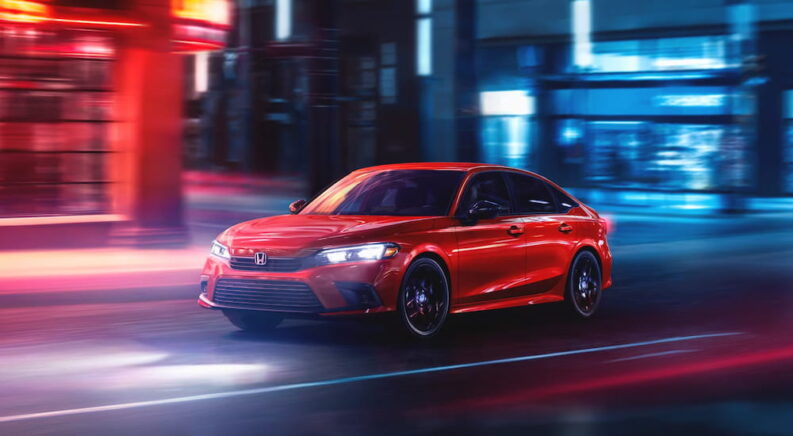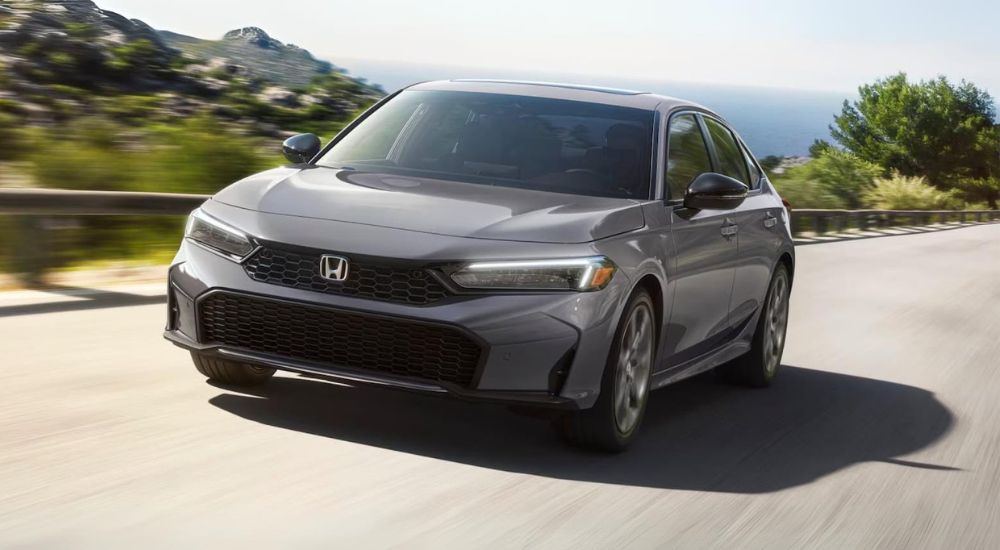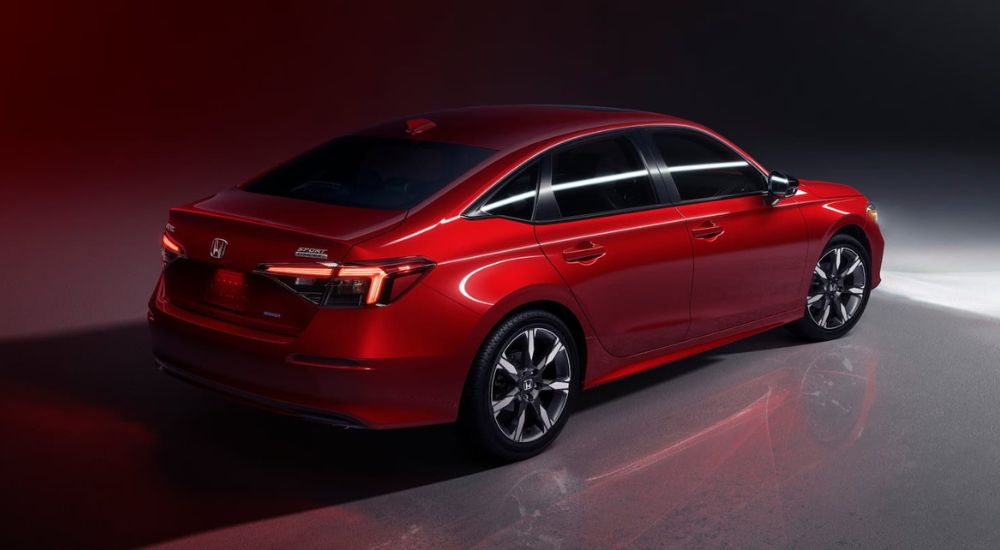While many early hybrid models prized efficiency above all else, the segment has come a long way over the last two decades. Today’s hybrids can match or even exceed their gas-powered counterparts in terms of performance. That’s certainly the case when it comes to the new Honda Civic Hybrid for sale, which joins the lineup for the 2025 model year. A little electrification goes a long way, with the Civic Hybrid besting the gas-powered model in terms of both horsepower and torque.
Honda’s compact has always been a standout in terms of performance, defying the segment’s budget-oriented reputation to deliver a thrilling ride that’s become a favorite of the tuning community. The hybrid powertrain has worked its way into the Civic lineup for 2025 in the form of the Sport Hybrid and Sport Touring Hybrid trims. As the name implies, these two hybrid models put a premium on performance with a sporty design to match the goods under the hood.
It sure looks like a promising formula, but the question remains: Can the new Civic Hybrid live up to the nameplate’s sporty reputation? I’ll examine the Hybrid’s engine, acceleration, and design, comparing it to two of the Civic’s sportiest iterations to determine if the new hybrid is as electrifying as it seems.
Powertrain
A 2.0-liter four-cylinder engine lies under the hood of every Civic Hybrid, but it’s the two AC motors that really deserve attention. With the ability to put out 181 hp at 5,000-6,000 RPM, the electric motors give the Hybrid a total output of 200 hp and 232 lb-ft of torque. That’s a significant upgrade over the non-hybrid Civic, which tops out at 150 hp and 133 lb-ft of torque with its 1.5-liter four-cylinder engine. Of course, power isn’t everything; the added weight of a hybrid’s electric motors and lithium-ion battery can start to weigh a vehicle down.
However, Honda has been careful to keep one eye on the scale when designing the new Civic Hybrid. This compact weighs just 282 lbs more than the non-hybrid version, which confers some real benefits in terms of performance and efficiency. Honda has redesigned the engine’s block, cylinder head, crank, connecting rods, and camshaft to give the Hybrid every advantage, and this setup has won its fair share of praise in a relatively short time, with the Civic’s Hybrid earning a 10 Best Engine & Propulsion System Award from Wards.
The 2025 Civic Hybrid also comes standard with three specialized drive modes that allow the compact to switch up its performance at the push of a button. Those looking to take advantage of its inherently efficient drivetrain will appreciate Econ mode, which manages to deliver the promised fuel efficiency without a noticeable downgrade in performance. Econ mode alters the Civic’s throttle response and adjusts the air conditioning systems to get the most out of every gallon, but drivers who really want to see what the Hybrid is capable of should make liberal use of Sport mode.
By upping the compact’s throttle response and reducing the steering assist, Sport mode turns the dependable daily driver into a fun, engaging ride that both looks and sounds the part. To that end, Active Sound Control pipes in some simulated engine noise while the digital gauge shifts to display a sporty set of dials that wouldn’t look out of place on a dedicated sports car.
Normal mode offers exactly what you’d expect, balancing power and efficiency for a solid everyday drive, while Individual mode gives drivers the opportunity to tune the Hybrid to their liking. Available on the range-topping Sport Touring Hybrid trim, Individual mode allows you to adjust the Civic’s gauges, steering, throttle response, and other settings for a one-of-a-kind ride that fits your unique driving style.
Acceleration
So, how does the Civic Hybrid’s power play out in the real world? A trusty zero-to-sixty test provides a helpful perspective on this compact’s performance potential. The Civic Hybrid’s 232 lb-ft of torque provides plenty of acceleration for all but the most high-performance applications, allowing the sedan to speed from zero to sixty in as little as 6.2 seconds. That represents a massive improvement over the purely gas-powered Civic, which takes 8.9 seconds to reach the same speed. In fact, the Hybrid is even quicker than one of the Civic’s performance-focused variants in the Civic Si, but we’ll get into that later.
The Civic Hybrid might have the internal combustion version beat by a fair margin, but it’s also worth looking into how the eco-friendly model stacks up against some of its compact and midsize competitors in the hybrid segment. Longtime Japanese rival Toyota gives the Civic its stiffest competition, with the 2024 Toyota Prius Prime XSE Premium offering a zero-to-sixty time of 6.3 seconds.
The 2025 Toyota Camry XSE AWD and Camry SE lag noticeably behind at 6.8 and 7.0 seconds, respectively. The 2024 Hyundai Sonata Limited Hybrid is even pokier at 8.6, and the 2024 Volkswagen Passat R-Line 1.5 eTSI Estate can hardly keep up with a zero-to-sixty showing of 8.9 seconds. Drivers who value the sportier side of the driving experience will appreciate the Civic Hybrid’s experience, but it’s not the only reason to give the new model a closer look.
Design
The Civic has always been known as one of the more stylish models in the compact class, and the Hybrid version is no different. Honda has treated the Hybrid to a body-color grille surround and front spoiler that immediately set it apart from the traditional Civic, though the gas-powered version also gains a restyled grille and front fascia, blacked-out headlight reflectors, and new taillights that lend the model a mature, high-end look. The Hybrid also rides lower than its predecessor thanks to a 0.4-inch drop that improves the model’s efficiency while giving it a slightly better center of gravity.
Specialized tires further enhance the Hybrid’s eco-friendly nature, providing 19% less rolling resistance without a noticeable sacrifice in terms of traction. Add in custom spring and damper tuning—as well as the stiffened front upper suspension mounts, front subframe mount, and rear lower suspension mounts that made their way onto all Civic models for 2025—and you can’t really argue against the Hybrid’s performance resume.
Like many hybrid models, Honda has outfitted the Civic Hybrid with a regenerative braking feature that steadily tops off the 1.1-kWh lithium-ion battery pack as you drive around town. The regenerative braking system offers four levels of performance that can be adjusted using handy paddle shifters: Level 1 provides minimal pushback while Levels 2, 3, and 4 steadily ramp up the resistance to keep the battery all juiced up.
Between the efficient four-cylinder engine, AC motors, and regenerative braking, drivers should have no problem achieving the Hybrid’s EPA-estimated 50 MPG in the city, 47 MPG on the highway, and 49 MPG combined. The non-hybrid Civic also gets a bump in fuel economy for 2025, delivering around 32 MPG in the city and 41 MPG on the highway; that’s not bad for the compact segment, but it can’t touch the high bar set by the Hybrid.
The Verdict
So, is the new Civic Hybrid as sporty as the classic model? The answer is yes, with one important caveat: While the Hybrid easily bests the gas-powered models in all the important performance-related categories, it still doesn’t deliver the edge-of-your-seat excitement of the Civic’s sportiest iteration in the Civic Type R. This high-performance variant turns the typically stolid Civic into a revelation on four wheels, providing drivers with the sort of power and speed that’s made it such a mainstay in the racing scene.
The Civic Type R employs the same 2.0-liter four-cylinder engine as the Hybrid but adds a potent turbocharger that gives the compact 315 hp and 310 lb-ft of torque. That combination is good enough for a blistering zero-to-sixty time of just 4.9 seconds and a top speed of 169 mph—but the engine is just a small part of the package when it comes to the Civic Type R. Honda has also outfitted this performance model with a larger radiator, a lighter flywheel, and an improved rev-match system that makes the Civic’s six-speed manual transmission exceedingly easy to work with. The Type R also has the bark to match its bite (and its $46,000 price tag) with an active exhaust valve that translates those RPMs into a guttural growl that immediately distinguishes the Type R from its tamer relatives.
If you’re looking for a better rival for the new Civic Hybrid, take a look at the Civic Si. The Si—or “Sport Injected”—version of the Civic is a lot more commensurate with the Hybrid in both performance and price, offering 200 hp for just over $31,000. The Si’s power comes courtesy of a 1.5-liter four-cylinder engine that, while smaller than the Hybrid’s 2.0-liter mill, adds a turbocharger that ups the compact’s performance credentials. The Si does hold a few advantages over the Hybrid with a standard limited-slip differential, upsized brake rotors, a firmer suspension, and a six-speed manual gearbox with a new rev-match feature for smoother shifts, but it trails the electrically-assisted version by 40 lb-ft of torque.
That gulf in torque means that the Hybrid can actually out-sprint its sporty cousin, which takes 6.6 seconds to get up to 60 mph. If Honda ever decides to give the Si a hybrid makeover, the differences between the two models might become a little more negligible, but for now, it’s hard to make an argument for the Si over the Civic Hybrid, especially when you factor in the added fuel efficiency.
The New 2025 Honda Civic Hybrid
Honda’s Civic Hybrid proves that efficiency doesn’t have to come at the cost of performance. Not only can the sporty compact deliver up to 50 MPG, but it also provides an engaging experience with 200 hp and the sort of nimble, responsive ride that’s long made the Civic a driver favorite. It’s a strong showing for the fledgling hybrid model, with the electrically-assisted Civic topping many of its competitors, and I only expect it to improve over the coming years. Sure, the Hybrid might not be able to surpass the legend that is the Civic Type R, but few compacts can.
The Civic Hybrid leaves the gas-powered version in the dust and even gives the Si a run for its money with a splintering zero-to-sixty time of 6.2 seconds. The Hybrid retains everything there is to love about the Civic while imbuing it with an exciting new powertrain that’ll have you spending less time at the pump and more time enjoying your ride.






